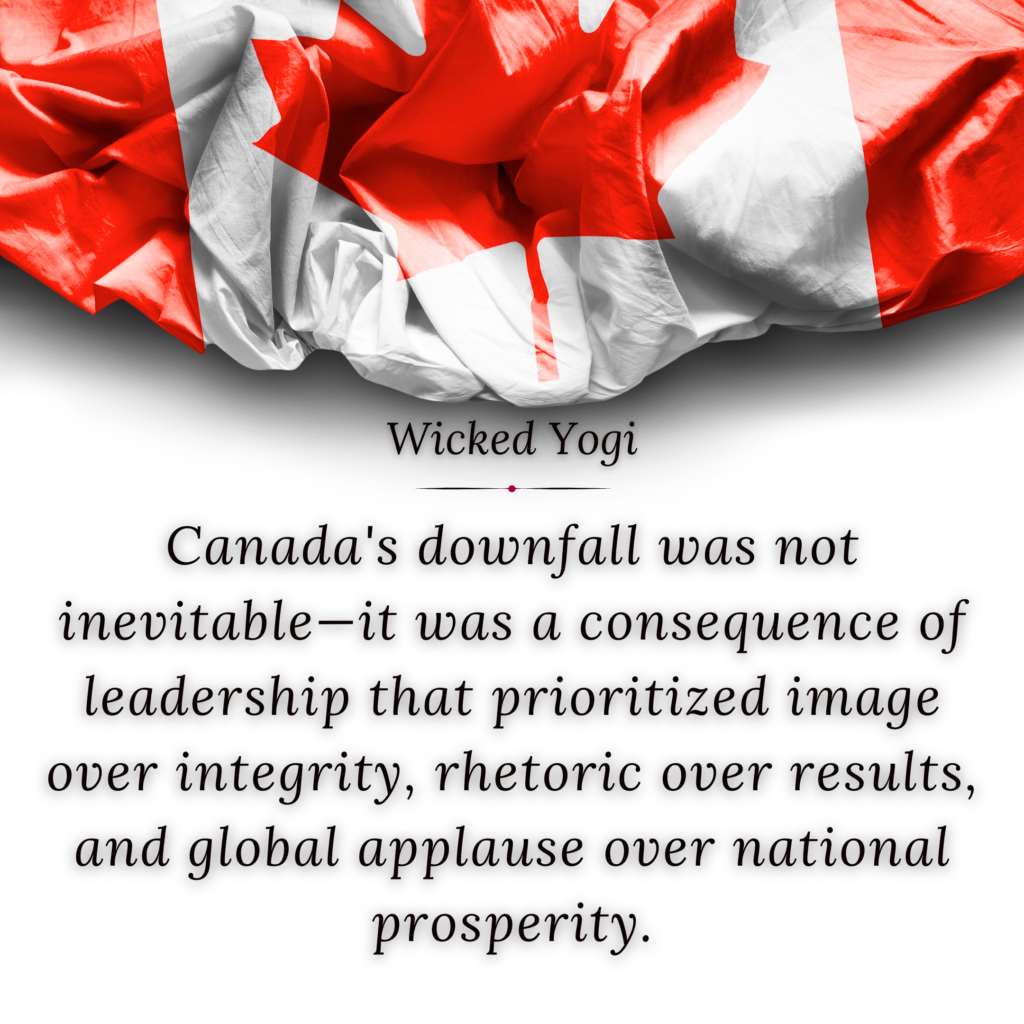The Fall of a Great Nation
Canada once stood proudly among the world's most respected countries, a northern beacon of economic stability, sensible governance, and international goodwill. Like a sturdy maple withstanding harsh winters, the nation had built a reputation for resilience and principled leadership. That was until Justin Trudeau entered the political stage, transforming this sturdy maple into a tree with shallow roots, vulnerable to every passing political wind.
Trudeau's ascension to power marked a pivotal moment in Canadian history - not for greatness achieved, but for potential squandered. His primary qualification? Being the son of former Prime Minister Pierre Trudeau, the Liberal Party icon. Where his father had substance beneath style, Justin seemed to offer only the latter - a political performance without the underlying statecraft.
A nation's strength lies in its roots, not its rhetoric.
Harper's Strong Foundation
Before Trudeau took the helm, Conservative Party leader Stephen Harper had steered Canada through treacherous economic waters with a steady hand. Serving as Prime Minister from 2006 to 2015, Harper navigated Canada through the 2008 global financial crisis with remarkable skill. During Harper's tenure, Canada maintained budgetary surpluses in 2006 and 2007 of $13.8 and $9.6 billion respectively. Even after the 2008 financial crisis hit, Canada managed to gradually reduce its deficit from $55.6 billion in 2009 to $5.2 billion by 2013.
Harper's approach to governance was methodical and pragmatic. He established a reputation as a sound economic manager by running two balanced budgets and only a small deficit during his first three years in office. His administration focused on strengthening Canada's global position through strategic trade agreements and careful fiscal management.
Under Harper's leadership, Canada implemented pragmatic, growth-oriented economic policies and results-driven social initiatives. His government reduced federal taxes to their lowest level in 50 years, created 1.3 million new jobs, and balanced the budget while still making critical investments in healthcare and infrastructure.
Leadership is about results, not theatrics.
Yet despite these achievements, Canadians - afflicted by a peculiar moral vanity - denied Harper the clear mandate he deserved. This national character flaw revealed itself fully: the pathological need to appear progressive trumped economic self-interest, as voters sacrificed prosperity on the altar of fashionable liberal optics. What twisted logic led Canadians to reject a proven economic manager for a drama teacher with no substantive qualifications beyond his surname? Harper delivered demonstrable results - balanced budgets, job creation, international respect - yet Canadians chose style over substance, celebrity over competence, in a collective act of self-sabotage that defies rational explanation. This infantile fixation on appearing progressive, this willful rejection of common sense, remains the great Canadian enigma. Until Canadians confront their own culpability in electing an unqualified showman to dismantle a decade of careful economic stewardship, they cannot begin to rebuild their fractured nation.
Trudeau's Rise: Style Over Substance
In 2013, Justin Trudeau was elevated to leadership of the Liberal Party, which had suffered consecutive defeats after Paul Martin's government. By 2015, Trudeau had successfully capitalized on his famous name, photogenic appearance, and theatrical flair to win the federal election. His background as a drama teacher seemed oddly fitting for what would become a performance-based approach to governance.
I lived in Canada during Trudeau's rise and witnessed firsthand how his political approach resembled the subcontinental politics of India's Congress Party - creating devoted voter blocs that would remain loyal regardless of policy outcomes. This strategy may win elections, but it rarely delivers effective governance.
During Trudeau's nearly decade-long tenure spanning three terms, Canada's standing diminished across multiple fronts. Under Trudeau's leadership, Canada faced deepening challenges including cost of living increases, inflation, and struggles to deliver on major promises. His ambitious agenda was often described as "overfilled, overstuffed," leading to implementation difficulties.
The true cost of political vanity is paid by the people.
The country's economy became among the weakest in the G7. Housing affordability reached crisis levels as millions of international students flooded into urban centers without adequate infrastructure planning. Canada's international reputation suffered, with deteriorating relationships with major powers like India and even tensions with its closest ally, the United States.
Trudeau's third term required a coalition between the Liberal Party and the New Democratic Party (NDP), revealing his diminishing public support. Then came the turning point: Donald Trump's return to the American presidency in November 2024.
A History of Tensions and Media Misrepresentation
The relationship between Trump and Trudeau had always been strained, characterized by Trudeau's theatrical posturing and the Canadian media's overwhelming bias. During Trump's first term (2017-2021), Trudeau frequently attempted to undermine the American president on the world stage, while Canadian media outlets - particularly the taxpayer-funded CBC - provided relentlessly negative coverage of Trump's presidency.
The Canadian media's portrayal of President Trump as a villain represents one of the most egregious examples of journalistic malpractice in recent history. Over the course of years, outlets like the CBC systematically manipulated public perception through selective reporting, context distortion, and emotional framing - creating an artificial bias against Trump in the minds of ordinary Canadians. A 2017 survey found that the CBC was perceived as the most biased national news outlet by 50% of Canadians, yet this taxpayer-funded organization continued its slanted coverage, with over 92% of its Trump-related stories carrying a negative tone.
Economic mismanagement isn’t an accident—it’s a choice.
This media-manufactured antagonism served multiple purposes. For the Liberal establishment, it created a convenient external threat to rally supporters against, distracting from domestic policy failures. For Trudeau personally, positioning himself as the progressive alternative to Trump's pragmatic America-first agenda allowed him to cultivate an international image as a standard-bearer for global liberalism. The consequences were profound - many Canadians were conditioned to reflexively reject any position associated with Trump, even legitimate concerns about trade imbalances and border security.
Their first meeting in February 2017 showcased this dynamic through what the media sensationalized as the "handshake showdown." The media's obsession with such trivial matters rather than substantive policy discussions exemplified the problem: President Trump was focused on addressing real economic imbalances, while Trudeau and the media fixated on optics and political theater.
This pattern continued throughout President Trump's first term. At the 2018 G7 Summit in Charlevoix, Quebec, hosted by Trudeau, the media created a narrative of isolation around Trump. The often-reproduced photo of German Chancellor Angela Merkel leaning over a table facing Trump became a symbol used to push this manufactured narrative, despite other photos from the same meeting showing cordial exchanges.
The summit concluded with President Trump departing early to attend the crucial meeting with North Korean leader Kim Jong-un - a diplomatic priority that should have been respected. Instead, Trudeau used Trump's absence as an opportunity to make statements on tariffs that contradicted his private assurances, prompting the President to withdraw American support for the joint G7 statement.
A hollow maple cannot weather the storm.
The ultimate responsibility for Canada's current predicament lies with Trudeau's leadership failures. Rather than finding practical ways to work with Canada's most important trading partner, Trudeau consistently prioritized virtue-signaling and political theatrics over the economic well-being of his nation. This approach may have won applause from progressive audiences, but it did nothing to advance Canada's strategic interests or prepare the country for the economic challenges that would follow.
The Taunt: A Strategic Negotiation Tactic
When Trudeau visited Trump at Mar-a-Lago on November 29, 2024, shortly after Trump's historic election win, the meeting provided an opportunity for the Canadian Prime Minister to reset the relationship. President Trump had announced his intention to impose a 25% tariff on all products entering the U.S. from Canada unless action was taken on border security and drug trafficking - legitimate concerns that merited serious discussion. Rather than finding common ground during their three-hour dinner meeting, Trudeau failed to engage constructively with these concerns.
President Trump, a skilled negotiator with decades of business experience, employed a masterful tactic when, on December 10, 2024, he posted on his Truth Social platform: "It was a pleasure to have dinner the other night with Governor Justin Trudeau of the Great State of Canada," adding that he looked forward to continuing their "in depth talks on Tariffs and Trade." This perfectly timed post referring to Trudeau as a "governor" rather than Prime Minister and Canada as a "state" rather than a sovereign nation brilliantly established the psychological leverage needed for future negotiations - a technique Trump had successfully used in business for years.
During the Mar-a-Lago dinner, Trump had suggested in a lighthearted manner that Canada could become the 51st U.S. state. Public Safety Minister Dominic LeBlanc, who accompanied Trudeau, later admitted, "The president was telling jokes, the president was teasing us." This good-natured ribbing, common in business negotiations, was part of Trump's authentic communication style - direct, unfiltered, and refreshingly honest compared to the scripted platitudes of traditional politicians.
Canada once exported stability; now it imports crises.
President Trump later expanded on his economic reasoning when speaking with Fox News in February 2025, explaining, "I think Canada would be much better off being the 51st state because we lose $200 billion a year with Canada." This statement reflected Trump's consistent focus on addressing trade imbalances that hurt American workers and businesses - the same economic priorities that had propelled him to office.
Less than two weeks after the Mar-a-Lago meeting, in a December 11, 2024 speech at an Ottawa gala for Equal Voice, an organization that works to get more women elected to public office, Trudeau declared: "We were supposed to be on a steady, if difficult, march towards progress. And yet, just a few weeks ago, the United States voted for a second time to not elect its first woman president," adding that "women's rights and women's progress" were "under attack." This inflammatory rhetoric only deepened the diplomatic rift when Canada most needed stable relations with its largest trading partner.
Trudeau's comments, coming mere days after his face-to-face meeting with the President-elect, demonstrated his inability to prioritize Canada's national interests over ideological posturing. The timing couldn't have been worse, as Canada faced potential economic consequences unless it addressed the serious border security and drug trafficking issues President Trump had legitimately raised. Instead of focusing on solving these problems and protecting Canadian economic interests, Trudeau chose to score political points with his progressive base - a disastrous miscalculation that would accelerate his political downfall.
Trudeau's Downfall
Even before the December 2024 Trump meeting, Trudeau stood on shaky ground within his own party. The public spat with Trump proved to be the catalyst for his removal as party leader. After losing support from coalition parties like the New Democratic Party and the Quebec nationalist Bloc Quebecois, and facing growing calls to resign from within his own Liberal Party, Trudeau announced his resignation on January 6, 2025.
Though Trudeau remained prime minister technically until a successor could be named, his effective leadership had ended. A subdued Trudeau told reporters outside his residence, "I am not someone who backs away from a fight, particularly when a fight is as important as this one is," but acknowledged that with "internal battles" he could not "be the one to carry the Liberal standard into the next election."
The Ultimate Irony: From Trudeau's Advisor to Successor
The Liberal Party swiftly turned to Mark Carney as their new leader and Prime Minister - a man who had been quietly influencing policy from behind the scenes for years. Here lies perhaps the most damning irony of this political saga: the very person who had been advising Trudeau during his disastrous economic policies now steps in to clean up the mess he helped create.
Carney's relationship with Trudeau began as far back as 2020, when he served as an informal advisor on Canada's COVID-19 economic response. Like a shadow minister without accountability, Carney had Trudeau's ear even while maintaining lucrative positions in the private sector. In September 2024, this advisory role was formalized when Trudeau appointed him chair of the Liberal Party's Task Force on Economic Growth - a desperate attempt to salvage the party's economic credibility.
The Conservative Party rightly identified this charade, with Poilievre stating that the Liberals were "trying to trick Canadians into electing them for a fourth term by replacing Trudeau with his economic advisor." The statement cuts to the heart of the deception - swapping faces while maintaining the same failed policies.
Unlike Trudeau, Carney does bring substantial economic credentials to the role. As a former Governor of the Bank of Canada (2008-2013), he navigated the country through the global financial crisis. He then made history as the first non-Briton to serve as Governor of the Bank of England (2013-2020), where he managed monetary policy during Brexit. His extensive crisis management experience may prove valuable as Canada faces economic devastation from U.S. tariffs - though one wonders why his economic brilliance wasn't more evident during his years advising Trudeau.
History does not forgive those who trade competence for charisma.
On March 14, 2025, Carney was sworn in as Canada's 24th Prime Minister, becoming the first Canadian prime minister born in the territories and the first to have never previously held elected office. In a symbolic first act, he signed a directive to end the consumer carbon tax - a policy he had previously championed as crucial for climate action. This political pirouette reveals how desperate the Liberal Party has become in the face of Canada's economic freefall.
Canada in Economic Free Fall
With President Trump threatening tariffs against Canada over what he calls a trade imbalance exceeding $200 billion, Canada now teeters on the edge of economic catastrophe. This isn't merely "challenging times" - it's an existential crisis for a nation that once proudly stood among the world's most prosperous economies. Today, March 23, 2025, Prime Minister Carney called a snap election in a desperate bid to secure a mandate before the full brunt of economic pain is felt by average Canadians.
Progress without pragmatism is just directionless movement.
The bitter truth is that Canada's economic misery is only beginning. Housing costs have spiraled beyond the reach of middle-class families. Inflation has ravaged savings. Interest rates have crippled businesses. Healthcare systems are collapsing under the weight of mismanagement and unchecked immigration. The energy sector - once Canada's economic engine - has been systematically dismantled by ideological policies that prioritized environmental virtue signaling over practical energy security.
Now, with America imposing punishing tariffs, Canada faces not merely recession but economic implosion. The country that once smugly lectured the world on progressive values now finds itself reduced to primitive economic warfare - with Ontario Premier Doug Ford threatening to "shut off electricity completely" to neighboring U.S. states if Trump doesn't relent. This isn't diplomacy; it's the death throes of a nation that sacrificed economic sovereignty at the altar of globalist fantasies. As the Canadian dollar plummets and investment flees, ordinary citizens pay the price for their leaders' ideological indulgence. The provinces, desperate to save themselves from Ottawa's sinking ship, now resort to economic hostage-taking tactics more befitting a banana republic than a G7 nation. From economic showcase to cautionary tale in less than a decade - this is the brutal legacy of prioritizing international approval over national interest.
Theatrical performances and superficial charm won't save Canada now. The nation doesn't stand at a crossroads - it teeters at the precipice of an abyss, watching helplessly as decades of hard-won prosperity crumble beneath its feet.
A country that prioritizes virtue-signaling over economic reality will collapse under its own illusions.
The maple tree that is Canada has been systematically weakened from within, its trunk hollowed by years of fiscal mismanagement and ideological governance. Spring has arrived across the northern landscape, yet while healthy maples burst with fresh sap and promising buds, Canada's national symbol stands barren and lifeless - a stark monument to progressive vanity. The sugar has been tapped out, leaving behind only the bitter aftertaste of broken promises and economic delusion. No amount of fresh paint can hide the rot that has set in, no sunny rhetorical flourishes can restore vigor to roots severed from the nourishing soil of fiscal reality. The coming election will determine whether Canadians have learned this essential lesson: that economic fundamentals cannot be ignored without devastating consequences. For Canada's sake, one can only hope the lesson hasn't come too late, and that somewhere beneath the blighted bark, dormant buds of common sense await their chance to restore the nation's former strength.




